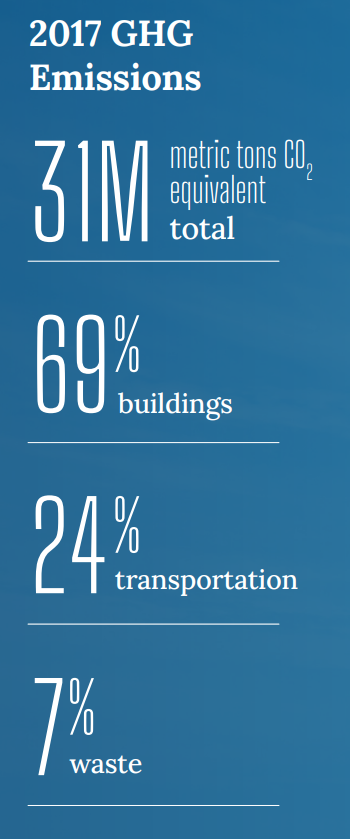Electrify Chicago
An independent tool for viewing City of Chicago building data
According to the
2022 Chicago Climate Action Plan,
69% of Chicago's emissions come from buildings, making
building emissions our biggest challenge and our biggest opportunity as a city
to tackle climate change. At Electrify Chicago, we showcase building performance using
publicly available data supplemented by community-submitted photographs and building
owners.
Start by looking at Chicago's buildings with the highest greenhouse gas intensity i.e. emissions per square foot. Large, efficient, buildings can perform much better than very inefficient small buildings on this metric.
New Article
📰 $30 Million In Missed Fines
The City Of Chicago failed to collect $30 million in potential fines from the building benchmarking ordinance, reducing transparency and accountability.
Legislative update! 🎉
As of late January 2024, legislation is being introduced to require new use more efficient forms of water and space heating, via the Clean And Affordable Buildings Ordinance (CABO), which will reduce the number of highly polluting and inefficient buildings that end up on this site.
If you're in Chicago,
write to your alderman to support the CABO!
Chicago Buildings by Greenhouse Gas Intensity
Note: Data includes large Chicago buildings with data from 2022, unless explicitly stated otherwise.
Note: This data only includes buildings whose emissions are reported
under the
Chicago Energy Benchmarking Ordinance. According to the City “As of 2016,
this list includes all commercial, institutional, and residential buildings larger than
50,000 square feet.” This dataset is also then filtered to only buildings with
reported emissions > 1,000 metric tons CO2 equivalent.
The latest year of data is from 2022, but we update the site regularly when new data is available, and some buildings may have failed to report that year, and only have older data available.
| Property Name / address | Primary Property Type |
Greenhouse Gas Intensity (kg CO2 eq./sqft) |
Total Greenhouse Emissions (metric tons CO2 eq.) |
|---|---|---|---|
|
Lawn Terrace Apartments
🕰️
2601 W 63rd St
| Multifamily Housing | 3.0 kg/sqft | 377 tons |
|
Hayes Manor Senior Apartments
🏆
1211 W MARQUETTE RD
| Multifamily Housing | 3.0 kg/sqft
Lowest 3%
| 114 tons
#12 Lowest in Chicago*
|
|
The Sexton Condominium Association
360 W Illinois St
| Multifamily Housing | 3.0 kg/sqft
Lowest 3%
| 1,155 tons
Highest 40%
|
|
Innisbrook V Condominium Association
🕰️
8509-25 W Catherine
| Multifamily Housing | 3.0 kg/sqft | 265 tons |
|
329 W 18th St
329 W 18th St
| Office | 3.0 kg/sqft
Lowest 3%
| 1,314 tons
Highest 36%
|
|
CA 23
15 23 N ABERDEEN ST
| Multifamily Housing | 3.0 kg/sqft
Lowest 3%
| 366 tons
Lowest 14%
|
|
350 W Belden Ave
350 W Belden Ave
| Multifamily Housing | 2.9 kg/sqft
Lowest 3%
| 408 tons
Lowest 17%
|
|
4434 4444 N Damen Ave
🏆
4434 4444 N Damen Ave
| Multifamily Housing | 2.9 kg/sqft
Lowest 3%
| 156 tons
#26 Lowest in Chicago*
|
|
Lincoln Lofts Condominium Association
🕰️
3151 N Lincoln Ave
| Multifamily Housing | 2.9 kg/sqft | 514 tons |
|
Cooper Dual Language Academy -CPS
🕰️
(CPS)
1624 W 19th St
| K-12 School | 2.9 kg/sqft | 385 tons |
|
River City - 800 South Wells
800 S Wells St
| Mixed Use Property | 2.9 kg/sqft
Lowest 3%
| 2,873 tons
Highest 15%
|
|
The Stratford at South Commons Condominium Association
2605 S Indiana Ave
| Multifamily Housing | 2.9 kg/sqft
Lowest 3%
| 2,422 tons
Highest 18%
|
|
3033 Sheridan Tower Condominium Association
3033 N Sheridan Rd
| Multifamily Housing | 2.9 kg/sqft
Lowest 3%
| 819 tons
Lowest 47%
|
|
Stewart Business Center
400 W 76th St
| Office | 2.9 kg/sqft
Lowest 3%
| 338 tons
Lowest 11%
|
|
1369 E HYDE PARK BLVD
1369 E HYDE PARK BLVD
| Multifamily Housing | 2.9 kg/sqft
Lowest 3%
| 191 tons
Lowest 2%
|
Data Source:
Chicago Energy Benchmarking Data
